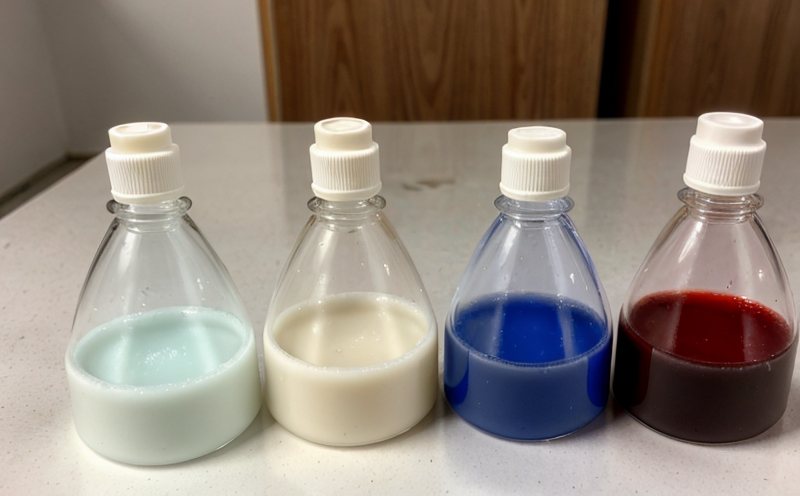JIS K7212 Monomer Combustion Testing in Plastics
The JIS K7212 standard is a critical guideline for assessing the combustibility of monomers and oligomers used in plastics. This test evaluates the flammability characteristics of these materials, providing crucial insights into their safe use in various applications. Understanding the combustion behavior of monomers and oligomers helps prevent potential hazards during manufacturing processes and end-use scenarios.
The procedure outlined in JIS K7212 involves subjecting a specified specimen to controlled conditions designed to simulate real-world exposure to heat and flame. The test aims to determine the self-ignition temperature, combustion behavior, and the amount of smoke produced by the material. This information is essential for ensuring that monomers and oligomers meet safety standards and can be used in applications where combustibility is a concern.
The testing process typically begins with the preparation of specimens according to JIS specifications. These samples are then exposed to defined heating conditions, allowing for precise measurement of their response to flame exposure. The results provide data on how quickly or slowly the material ignites and spreads fire, as well as the quantity of smoke produced.
Understanding these parameters is vital in industries where plastics containing monomers and oligomers are used, such as electronics, automotive components, and construction materials. By adhering to JIS K7212 standards, manufacturers can ensure that their products comply with international safety regulations and contribute to a safer environment for consumers.
Accurate testing is crucial in this process. Our laboratory uses state-of-the-art equipment and follows rigorous procedures to ensure reliable and reproducible results. We employ highly trained staff who are experts in the field, ensuring that every test conducted adheres strictly to JIS K7212 guidelines.
| Parameter | Description |
|---|---|
| Self-Ignition Temperature | The lowest temperature at which a material will ignite without an external source of ignition. |
| Flame Spread Rate | Measure of how quickly the flame spreads across the sample surface. |
| Smoke Production | Amount and rate at which smoke is generated during combustion. |
The data collected from JIS K7212 testing provides valuable information to manufacturers, enabling them to make informed decisions about material selection. This helps in reducing risks associated with product design and ensures compliance with international safety standards.
- Ensures safe handling during manufacturing processes.
- Aids in meeting regulatory requirements for various industries.
- Reduces potential hazards in end-use applications.
In summary, JIS K7212 monomer combustion testing is a vital tool in the quality control and safety assurance of materials used in plastics. By adhering to these standards, manufacturers can ensure that their products are safe, reliable, and compliant with international regulations.
Quality and Reliability Assurance
- Consistent Testing Procedures: Our laboratory employs standardized methods for specimen preparation and testing to ensure consistent results.
- Advanced Equipment: We utilize high-precision instruments that meet international standards, guaranteeing accurate measurements.
The quality of our services is paramount. To maintain reliability, we conduct regular calibration checks on all equipment used in JIS K7212 testing. This ensures that every measurement taken adheres to the strictest tolerances required by the standard.
Our team consists of experts with extensive experience in chemical testing and analysis. They are committed to providing accurate and reliable results, which are critical for maintaining product quality and safety. We also participate in proficiency tests organized by recognized bodies to further validate our capabilities.
By adhering to these rigorous standards, we ensure that the data generated through JIS K7212 testing is trustworthy and can be relied upon by clients across various industries.
International Acceptance and Recognition
The JIS K7212 standard has gained significant recognition worldwide, particularly in regions where plastics and chemical materials are extensively used. Many countries have adopted this guideline as a benchmark for evaluating the combustibility of monomers and oligomers.
The acceptance of JIS K7212 extends beyond national borders, with numerous international organizations endorsing its use. This includes bodies such as the International Organization for Standardization (ISO) and ASTM International. Compliance with these standards is often a requirement in global markets, ensuring that products meet safety and quality benchmarks.
By adhering to JIS K7212 guidelines, manufacturers can tap into international markets while maintaining compliance with local regulations. This standard provides a uniform approach to testing, which simplifies the process of exporting goods across different jurisdictions.
The widespread acceptance of this standard reflects its importance in ensuring product safety and reliability. It serves as a critical tool for quality assurance in industries that rely on plastics containing monomers and oligomers.
Use Cases and Application Examples
- Electronics Industry: Ensuring the safe use of materials in circuit boards and connectors.
- Automotive Sector: Evaluating the safety of plastics used in vehicle interiors and exterior components.
- Construction Materials: Assessing the combustibility of insulation and structural elements.
In the electronics industry, JIS K7212 testing is essential for ensuring that materials used in circuit boards and connectors do not pose a fire hazard. This helps prevent potential accidents during manufacturing or installation processes.
The automotive sector relies on this test to evaluate the safety of plastics used in vehicle interiors and exterior components. By adhering to JIS K7212 standards, manufacturers can ensure that these materials are safe for use without compromising on quality.
In construction, evaluating the combustibility of insulation and structural elements is crucial. JIS K7212 testing helps identify any potential risks associated with the use of these materials in buildings, ensuring safety and compliance with regulations.
| Industry | Application |
|---|---|
| Electronics | Circuit boards, connectors |
| Automotive | Vehicles interiors and exterior components |
| Construction | Insulation, structural elements |
The results of these tests are critical in ensuring that materials used in these industries meet the highest safety standards. By adhering to JIS K7212 guidelines, manufacturers can reduce risks and ensure compliance with international regulations.





